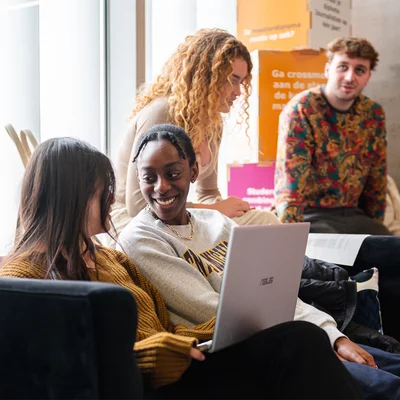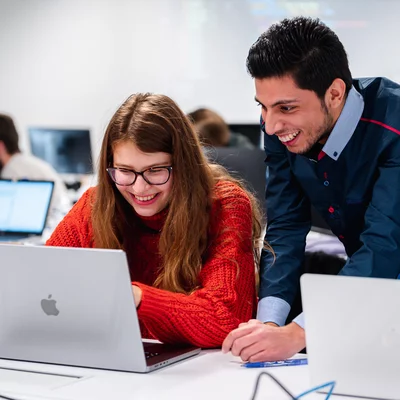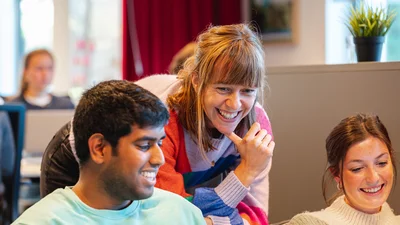
Thanks to our permanent connection with the field, we are an excellent choice as a partner in education, research and services. Every programme and activity bears our quality label. With teaching methods that are both innovative and relevant, we deliver enterprising and competent professionals brimming with practical knowledge and skills. As a result, they are naturally in high demand in the professional field.
In addition, our research with impact makes us a beacon of quality for society. We speak the language of the field and are known for our drive. With bold choices, leadership and flexibility, we make our mark on tomorrow's world.
The University of Applied Sciences is working very purposefully towards the realisation of the Bologna targets 2020 which aim at graduating more higher educated people. Most of the study programmes have course variants that enable study, work and family, although the combination is not always easy for the student/course participant. In the future, the university of applied sciences wants to focus even more on 'blended learning' and partial or full distance learning. Workplace learning and dual learning also entail new possibilities. Furthermore, there is a growing offer of 'lifelong learning' by organising new postgraduate and continuing education.
Regional and international anchoring
The college anchors itself regionally and internationally by connecting strategic partners to the institution in a qualitative and sustainable way.
Regional anchoring
The regional anchoring is concretised in extensive cooperation, for example in projects with Ghent University, the city of Ghent and the Province of East Flanders, the many schools and hospitals, midfield associations, associations for entrepreneurs and employers, etc. The regional cooperative links are further strengthened in both East and West Flanders via the HBO5 partner courses in the Arteveldehogeschool learning network. Ghent is a city, with an extensive service, education and care sector providing numerous internships and employment.
Ghent is also a city of creativity and culture in which students can participate with their creativity and entrepreneurial spirit in numerous projects. Collaboration with the numerous disadvantaged groups present in the city is achieved through all kinds of 'community service learning' projects from many courses. The college also makes special efforts to lead students from these disadvantaged groups into higher education and guide them during their studies for a successful career.
International anchoring
Internationally, the university of applied sciences aims to be a recognised quality institution with programmes that are attractive to international students and participate in a number of strategic international networks. Not only student and staff mobility contribute to this, but also through intensive cooperation in education and research, in quality assurance and policy, the university aims to be a coveted benchmark partner in the international education space. Students who are not internationally mobile are also given the opportunity to participate in internationalisation activities as part of internationalisation@home.

Emphasis on research
The importance of the research-education nexus is clear: quality and innovative higher education are fuelled from research, through implementation of new knowledge and insights. In the context of participation in international research programmes (e.g. Horizon 2020), strategic partners, nationally and internationally, are important.

What do we stand for?
Artevelde UAS is a Christian-inspired university college and translates its identity into a contemporary context. The college wants to be a dialogue college, where staff and students enter into dialogue from their Christian identity with colleagues and students of other beliefs. "Together with Christians, Muslims, Jews, other believers or non-believers, we want to find meaning in life and living together ... Through this dialogue, we are convinced that we can contribute to an open, meaningful, tolerant and sustainable society where there is room for everyone" (L. Boeve, 2014).
Warm, innovative and entrepreneurial organisational culture
Christian inspiration guides decisions and decision-making. This is reflected, among other things, in many aspects of teaching, research and service and the respectful, emancipatory and caring relationship with stakeholders, staff and students. This identity also forces us to make choices, among other things, in themes of research lines and forms of guidance. The university wants to guarantee a warm, appreciative, open, innovative and enterprising organisational culture based on a society characterised by diversity and complexity for its students and staff. Quality is of paramount importance here.
The University of Applied Sciences adopts an integrated approach in its policy implementation: both the processes belonging to its core tasks and the peripheral processes (ICT, finances, infrastructure, etc.) are of equal value and carefully coordinated in a coherent interplay. A good education cannot be organised without solid support. The quality assurance based on this is, therefore, also integral.
Sharing expertise
The university of applied sciences also fulfils its social role by valorising and disseminating internal expertise to the professional field and broader society. Research and services and lifelong learning offered in many partnerships in mutual interaction with the professional field and society strengthen the qualitative image of the university of applied sciences. A well-developed continuing education programme ensures that alumni and the wider professional area can further broaden and/or deepen the competencies acquired. An ever-growing number of socially relevant postgraduates, attractive continuing education programmes and continuing specialised bachelor-after-bachelor courses guarantee this.



